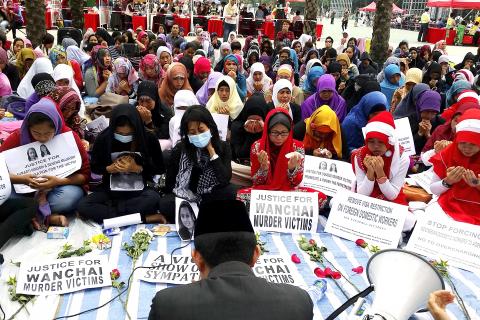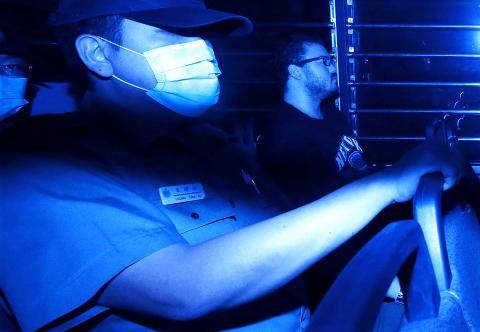The banker, Rurik George Caton Jutting, a Cambridge graduate, came from London in 2013, one of thousands of expatriates who arrive in Hong Kong every year to pursue jobs in banking and burnish their resumes with Asia experience. Mostly men, they often live expense-account-subsidized lives in luxury high-rise apartments, patronizing trendy Western bars at night and socializing at members-only tennis and yacht clubs on weekends.
The women, Seneng Mujiasih, 29, and 23-year-old Sumarti Ningsih also came to Hong Kong to better their lives.
Leaving poverty in rural Indonesia, they were among the city’s more than 300,000 foreign domestic workers, mostly women from Southeast Asia, earning as little as US$530 a month cleaning houses and caring for children and old people, six days a week, 17 hours a day.

Photo: Reuters
Their worlds collided, the authorities believe, in the garish neon bars of Hong Kong’s red light district of Wan Chai, where Asian women, often current or former housemaids, earn extra money selling overpriced drinks and furtive sex to foreign men.
The encounters ended with death in Jutting’s apartment. Seneng’s body was found by the police in the early morning of Nov. 1, with cuts to the throat and buttocks. Sumarti was found hours later, her decomposing corpse stuffed into a suitcase on the balcony. The police said she had died on Oct. 27. Jutting, 29, who had called the police, was charged with two counts of murder. He is now being evaluated to determine whether he is mentally fit to stand trial; if convicted, he would face life in prison.
The police have released few other details. How Jutting met the women, the nature of their relationship and investigators’ theories about the motive for the killings are not publicly known.

Photo: Reuters
But interviews with friends, relatives and acquaintances, as well as extensive records left online by the suspect and the victims, yield a detailed portrait of a side of this financial capital that is rarely seen.
They tell the story of impoverished immigrants who, trapped by harsh work rules that relegate them to second-class status and desperate to support families at home, were drawn to the bars of Wan Chai, and a banker who had a great deal of expendable income, and, according to his Facebook page, an abiding interest in young Asian women.
Seneng means “happiness” in Javanese, and Seneng tried to bring some to her family, sending money home every three months to help them build a house, pay for her mother’s diabetes medicine, buy a bed.
A friend, who did not want to be identified because she has started a new life in Indonesia and does not want her Hong Kong history publicized, said she and Seneng held two jobs in Hong Kong, working part time as domestic servants during the day and as prostitutes at night. At places like the New Makati Pub & Disco, a dimly-lit walk-up bar, they could make as much as US$100 on a busy night by encouraging men to buy drinks, and more than US$250 for sex.
It was a double life that Seneng, who also went by the name Jesse Lorena, seemed to embrace.
Photos on her Facebook profile show her as a fun-loving woman who liked to hang out at Hong Kong nightclubs and post sexually suggestive photos that drew admiring comments. But other photos show her fully covered in Muslim dress, a head scarf over her hair.
The friend said the maid’s job was enough to pay for room and board but left nothing to send home. Working the bars in Wan Chai seemed the only way. “We didn’t want to be like this forever,” she said.
Like Seneng, Sumarti, called Aliz by friends, was by far the biggest breadwinner in her family, sending the equivalent of US$300 every month to help pay for the care of her son, Novan, who turns 5 this month. She left school at 13. She had worked as a servant here, came back on a tourist visa and was to have returned to Jakarta on Nov. 3. Her family said she had recently taken a DJ course in Jakarta.
“She made me happy,” said a friend, Susiati. “She had to take care of her son, and it wasn’t easy.”
Jutting had been working in Hong Kong more than a year, after starting at Bank of America Merrill Lynch in London in 2010, in the derivatives unit.
He was “well regarded and a hard worker,” a co-worker said, and liked to travel to neighboring countries in Southeast Asia on weekends.
With four years of experience, he would have been earning US$600,000 to US$800,000 a year, according to a banker familiar with the company’s compensation.
The gulf between the haves and have-nots in Hong Kong is among the world’s widest.
This gap is reinforced by laws that rights groups say institutionalize a caste system among foreigners, putting expatriate business people like Jutting at the top and migrant workers such as Seneng and Sumarti at the bottom.
Domestic servants, called helpers, cannot apply for permanent residency, which businessmen like Jutting qualify after seven years. And they are subject to a special pay scale, with a wage floor that works out to about two-thirds less than Hong Kong’s minimum wage of US$3.87 an hour.
The law also makes their lives here dependent on remaining in the good graces of their employers. If dismissed, they have 14 days to leave the country and must pay hundreds, if not thousands of dollars, to placement agencies to arrange a return.
Robert Van den Bosch, 47, entertainment manager for the Queen Victoria pub on Lockhart Road, said he had known Seneng for two years and had identified her photos to the police.
He said that she had worked at bars in Wan Chai where men would buy her drinks. She would get a cut from the bar, about US$2 to US$3 a drink. Working six days a week, she could earn as much as US$580 a month, more than a housemaid’s salary, he said.
The last time he saw Seneng was on the night of Oct. 31, hours before the police say she was killed. She gave him two kisses, as usual, and said she was off to the New Makati a few doors down. By then Jutting had stopped showing up for work regularly, his co-worker said, and had gained weight. On Oct. 27, he said, Jutting resigned.
On the night of Oct. 31, about the time Seneng was saying goodbye to Van den Bosch, Jutting posted what was to be his final public Facebook entry before his arrest.
Citing an article about a study showing increasing happiness in countries with growing economies, he wrote, “Money DOES buy happiness: Growing wealth of Asian nations is making their people happier — but women are more content than men.”
It is not clear how Seneng ended up in Jutting’s apartment.
On Nov. 9, about 200 people, mostly Indonesian women, attended a memorial service in Victoria Park. Sumarti’s friend, Susiati, sat on a blanket, wearing a surgical mask to hide her face. She and a cousin of Sumarti’s held photos of the two dead women. White roses were laid out in front of them.
A Muslim cleric, Muhammad Faisal Firdaus, offered a prayer and a eulogy.
“They are accused of being sex workers, but it is not known why they do so,” he said. “See them as human beings.”

June 23 to June 29 After capturing the walled city of Hsinchu on June 22, 1895, the Japanese hoped to quickly push south and seize control of Taiwan’s entire west coast — but their advance was stalled for more than a month. Not only did local Hakka fighters continue to cause them headaches, resistance forces even attempted to retake the city three times. “We had planned to occupy Anping (Tainan) and Takao (Kaohsiung) as soon as possible, but ever since we took Hsinchu, nearby bandits proclaiming to be ‘righteous people’ (義民) have been destroying train tracks and electrical cables, and gathering in villages

Dr. Y. Tony Yang, Associate Dean of Health Policy and Population Science at George Washington University, argued last week in a piece for the Taipei Times about former president Ma Ying-jeou (馬英九) leading a student delegation to the People’s Republic of China (PRC) that, “The real question is not whether Ma’s visit helps or hurts Taiwan — it is why Taiwan lacks a sophisticated, multi-track approach to one of the most complex geopolitical relationships in the world” (“Ma’s Visit, DPP’s Blind Spot,” June 18, page 8). Yang contends that the Democratic Progressive Party (DPP) has a blind spot: “By treating any

Swooping low over the banks of a Nile River tributary, an aid flight run by retired American military officers released a stream of food-stuffed sacks over a town emptied by fighting in South Sudan, a country wracked by conflict. Last week’s air drop was the latest in a controversial development — private contracting firms led by former US intelligence officers and military veterans delivering aid to some of the world’s deadliest conflict zones, in operations organized with governments that are combatants in the conflicts. The moves are roiling the global aid community, which warns of a more militarized, politicized and profit-seeking trend

This year will go down in the history books. Taiwan faces enormous turmoil and uncertainty in the coming months. Which political parties are in a good position to handle big changes? All of the main parties are beset with challenges. Taking stock, this column examined the Taiwan People’s Party (TPP) (“Huang Kuo-chang’s choking the life out of the TPP,” May 28, page 12), the Democratic Progressive Party (DPP) (“Challenges amid choppy waters for the DPP,” June 14, page 12) and the Chinese Nationalist Party (KMT) (“KMT struggles to seize opportunities as ‘interesting times’ loom,” June 20, page 11). Times like these can